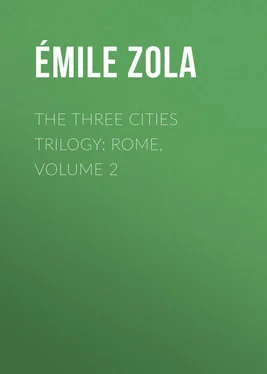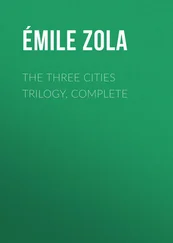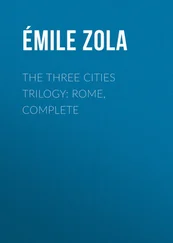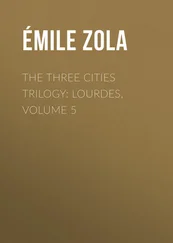Émile Zola - The Three Cities Trilogy - Rome, Volume 2
Здесь есть возможность читать онлайн «Émile Zola - The Three Cities Trilogy - Rome, Volume 2» — ознакомительный отрывок электронной книги совершенно бесплатно, а после прочтения отрывка купить полную версию. В некоторых случаях можно слушать аудио, скачать через торрент в формате fb2 и присутствует краткое содержание. Жанр: literature_19, foreign_antique, foreign_prose, на английском языке. Описание произведения, (предисловие) а так же отзывы посетителей доступны на портале библиотеки ЛибКат.
- Название:The Three Cities Trilogy: Rome, Volume 2
- Автор:
- Жанр:
- Год:неизвестен
- ISBN:нет данных
- Рейтинг книги:4 / 5. Голосов: 1
-
Избранное:Добавить в избранное
- Отзывы:
-
Ваша оценка:
- 80
- 1
- 2
- 3
- 4
- 5
The Three Cities Trilogy: Rome, Volume 2: краткое содержание, описание и аннотация
Предлагаем к чтению аннотацию, описание, краткое содержание или предисловие (зависит от того, что написал сам автор книги «The Three Cities Trilogy: Rome, Volume 2»). Если вы не нашли необходимую информацию о книге — напишите в комментариях, мы постараемся отыскать её.
The Three Cities Trilogy: Rome, Volume 2 — читать онлайн ознакомительный отрывок
Ниже представлен текст книги, разбитый по страницам. Система сохранения места последней прочитанной страницы, позволяет с удобством читать онлайн бесплатно книгу «The Three Cities Trilogy: Rome, Volume 2», без необходимости каждый раз заново искать на чём Вы остановились. Поставьте закладку, и сможете в любой момент перейти на страницу, на которой закончили чтение.
Интервал:
Закладка:
But all at once came a thunderbolt. One morning, as he was going downstairs, Orlando was stricken with paralysis. Both his legs suddenly became lifeless, as heavy as lead. It was necessary to carry him up again, and never since had he set foot on the street pavement. At that time he had just completed his fifty-sixth year, and for fourteen years since he had remained in his arm-chair, as motionless as stone, he who had so impetuously trod every battlefield of Italy. It was a pitiful business, the collapse of a hero. And worst of all, from that room where he was for ever imprisoned, the old soldier beheld the slow crumbling of all his hopes, and fell into dismal melancholy, full of unacknowledged fear for the future. Now that the intoxication of action no longer dimmed his eyes, now that he spent his long and empty days in thought, his vision became clear. Italy, which he had desired to see so powerful, so triumphant in her unity, was acting madly, rushing to ruin, possibly to bankruptcy. Rome, which to him had ever been the one necessary capital, the city of unparalleled glory, requisite for the sovereign people of to-morrow, seemed unwilling to take upon herself the part of a great modern metropolis; heavy as a corpse she weighed with all her centuries on the bosom of the young nation. Moreover, his son Luigi distressed him. Rebellious to all guidance, the young man had become one of the devouring offsprings of conquest, eager to despoil that Italy, that Rome, which his father seemed to have desired solely in order that he might pillage them and batten on them. Orlando had vainly opposed Luigi's departure from the ministry, his participation in the frantic speculations on land and house property to which the mad building of the new districts had given rise. But at the same time he loved his son, and was reduced to silence, especially now when everything had succeeded with Luigi, even his most risky financial ventures, such as the transformation of the Villa Montefiori into a perfect town – a colossal enterprise in which many of great wealth had been ruined, but whence he himself had emerged with millions. And it was in part for this reason that Orlando, sad and silent, had obstinately restricted himself to one small room on the third floor of the little palazzo erected by Luigi in the Via Venti Settembre – a room where he lived cloistered with a single servant, subsisting on his own scanty income, and accepting nothing but that modest hospitality from his son.
As Pierre reached that new Via Venti Settembre 3 3 The name – Twentieth September Street – was given to the thoroughfare to commemorate the date of the occupation of Rome by Victor Emmanuel's army. – Trans.
which climbs the side and summit of the Viminal hill, he was struck by the heavy sumptuousness of the new "palaces," which betokened among the moderns the same taste for the huge that marked the ancient Romans. In the warm afternoon glow, blent of purple and old gold, the broad, triumphant thoroughfare, with its endless rows of white house-fronts, bore witness to new Rome's proud hope of futurity and sovereign power. And Pierre fairly gasped when he beheld the Palazzo delle Finanze, or Treasury, a gigantic erection, a cyclopean cube with a profusion of columns, balconies, pediments, and sculptured work, to which the building mania had given birth in a day of immoderate pride. And on the other side of the street, a little higher up, before reaching the Villa Bonaparte, stood Count Prada's little palazzo.
After discharging his driver, Pierre for a moment remained somewhat embarrassed. The door was open, and he entered the vestibule; but, as at the mansion in the Via Giulia, no door porter or servant was to be seen. So he had to make up his mind to ascend the monumental stairs, which with their marble balustrades seemed to be copied, on a smaller scale, from those of the Palazzo Boccanera. And there was much the same cold bareness, tempered, however, by a carpet and red door-hangings, which contrasted vividly with the white stucco of the walls. The reception-rooms, sixteen feet high, were on the first floor, and as a door chanced to be ajar he caught a glimpse of two /salons/, one following the other, and both displaying quite modern richness, with a profusion of silk and velvet hangings, gilt furniture, and lofty mirrors reflecting a pompous assemblage of stands and tables. And still there was nobody, not a soul, in that seemingly forsaken abode, which exhaled nought of woman's presence. Indeed Pierre was on the point of going down again to ring, when a footman at last presented himself.
"Count Prada, if you please."
The servant silently surveyed the little priest, and seemed to understand. "The father or the son?" he asked.
"The father, Count Orlando Prada."
"Oh! that's on the third floor." And he condescended to add: "The little door on the right-hand side of the landing. Knock loudly if you wish to be admitted."
Pierre indeed had to knock twice, and then a little withered old man of military appearance, a former soldier who had remained in the Count's service, opened the door and apologised for the delay by saying that he had been attending to his master's legs. Immediately afterwards he announced the visitor, and the latter, after passing through a dim and narrow ante-room, was lost in amazement on finding himself in a relatively small chamber, extremely bare and bright, with wall-paper of a light hue studded with tiny blue flowers. Behind a screen was an iron bedstead, the soldier's pallet, and there was no other furniture than the arm-chair in which the cripple spent his days, with a table of black wood placed near him, and covered with books and papers, and two old straw-seated chairs which served for the accommodation of the infrequent visitors. A few planks, fixed to one of the walls, did duty as book-shelves. However, the broad, clear, curtainless window overlooked the most admirable panorama of Rome that could be desired.
Then the room disappeared from before Pierre's eyes, and with a sudden shock of deep emotion he only beheld old Orlando, the old blanched lion, still superb, broad, and tall. A forest of white hair crowned his powerful head, with its thick mouth, fleshy broken nose, and large, sparkling, black eyes. A long white beard streamed down with the vigour of youth, curling like that of an ancient god. By that leonine muzzle one divined what great passions had growled within; but all, carnal and intellectual alike, had erupted in patriotism, in wild bravery, and riotous love of independence. And the old stricken hero, his torso still erect, was fixed there on his straw-seated arm-chair, with lifeless legs buried beneath a black wrapper. Alone did his arms and hands live, and his face beam with strength and intelligence.
Orlando turned towards his servant, and gently said to him: "You can go away, Batista. Come back in a couple of hours." Then, looking Pierre full in the face, he exclaimed in a voice which was still sonorous despite his seventy years: "So it's you at last, my dear Monsieur Froment, and we shall be able to chat at our ease. There, take that chair, and sit down in front of me."
He had noticed the glance of surprise which the young priest had cast upon the bareness of the room, and he gaily added: "You will excuse me for receiving you in my cell. Yes, I live here like a monk, like an old invalided soldier, henceforth withdrawn from active life. My son long begged me to take one of the fine rooms downstairs. But what would have been the use of it? I have no needs, and I scarcely care for feather beds, for my old bones are accustomed to the hard ground. And then too I have such a fine view up here, all Rome presenting herself to me, now that I can no longer go to her."
With a wave of the hand towards the window he sought to hide the embarrassment, the slight flush which came to him each time that he thus excused his son; unwilling as he was to tell the true reason, the scruple of probity which had made him obstinately cling to his bare pauper's lodging.
Читать дальшеИнтервал:
Закладка:
Похожие книги на «The Three Cities Trilogy: Rome, Volume 2»
Представляем Вашему вниманию похожие книги на «The Three Cities Trilogy: Rome, Volume 2» списком для выбора. Мы отобрали схожую по названию и смыслу литературу в надежде предоставить читателям больше вариантов отыскать новые, интересные, ещё непрочитанные произведения.
Обсуждение, отзывы о книге «The Three Cities Trilogy: Rome, Volume 2» и просто собственные мнения читателей. Оставьте ваши комментарии, напишите, что Вы думаете о произведении, его смысле или главных героях. Укажите что конкретно понравилось, а что нет, и почему Вы так считаете.












